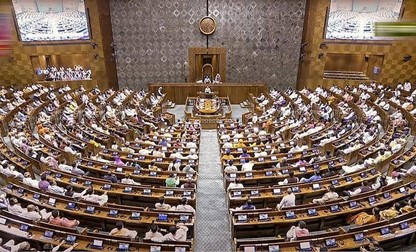The Waqf (Amendment) Bill was cleared by the Lok Sabha on Thursday after a 12-hour-long debate, with 288 members voting in favor and 232 against. The ruling National Democratic Alliance (NDA) described the bill as a crucial reform for transparency and minority welfare, while the opposition voiced concerns over its implications. All amendments proposed by opposition members were rejected by voice votes.
What is Waqf?
The Waqf (Amendment) Bill, 2025, is a significant step towards reforming the management of Waqf properties in India. Rooted in Islamic law and tradition, Waqf refers to an endowment made by a Muslim for charitable or religious purposes, such as building mosques, schools, hospitals, or other public institutions. A key characteristic of Waqf property is its inalienability, meaning it cannot be sold, gifted, inherited, or encumbered once it is designated as Waqf.
Challenges in Waqf Property Management
Over the years, mismanagement, corruption, and inefficiencies have plagued the administration of Waqf properties, preventing them from serving their intended purpose of benefiting underprivileged communities. The Waqf (Amendment) Bill, 2025, seeks to address these challenges by introducing measures to enhance transparency, accountability, and efficiency in Waqf management.
Ensuring Transparency and Preventing Corruption
A major issue has been the lack of transparency in Waqf property management, which has led to corruption and financial mismanagement. To combat this, the bill mandates the digitisation of all Waqf records, ensuring easy access and real-time monitoring. A centralised digital portal will track Waqf properties, helping to prevent unauthorised transactions and ensuring that funds are used exclusively for social welfare.
Addressing Legal Disputes and Land Encroachments
Legal disputes and prolonged litigations have been a persistent problem, with thousands of cases pending over land encroachments and ownership claims. The bill introduces stricter regulations to curb the unauthorised declaration of properties as Waqf land, a practice that has led to conflicts in several states. For example, in Tamil Nadu, a farmer in Thiruchenthurai village was unable to sell his land due to Waqf Board claims over the entire village. Similar disputes have emerged in Bihar, Kerala, Karnataka, and Uttar Pradesh, affecting thousands of families. By addressing such issues, the bill ensures that property rights are protected while maintaining the integrity of Waqf institutions.
Empowering Muslim Women
The amendment also prioritizes the welfare of Muslim women, particularly widows and divorced women, by promoting self-help groups and financial independence programs. It ensures greater representation of women in Waqf Boards and supports initiatives such as scholarships for Muslim girls, vocational training programs, and legal aid centers for inheritance disputes and domestic violence cases. By empowering women, the bill seeks to make Waqf governance more inclusive and responsive to community needs.
Enhancing Healthcare Access
Healthcare access for the poor is another key focus of the bill. With better management of Waqf properties, more resources can be directed towards establishing clinics and hospitals, funding medical aid programs, and providing essential medicines in underserved areas. The bill encourages partnerships with charitable organisations to expand healthcare services, ensuring that Waqf properties contribute directly to improving public health.
Improving Education and Skill Development
Education plays a critical role in uplifting marginalized communities. The bill facilitates the construction and maintenance of schools and madrassas, offering scholarships and financial aid to students from low-income backgrounds. It also promotes vocational training centers to equip young people with job-ready skills, increasing their employment opportunities and economic stability.
Addressing Housing Needs
Housing is another essential aspect addressed by the bill. Many poor families struggle to afford proper shelter, and Waqf properties can play a vital role in providing low-cost housing solutions. The amendment allows Waqf Boards to use designated properties for affordable housing projects, shelters for the homeless, and subsidised rental programs for economically weaker sections. This initiative ensures that Waqf resources are used to address critical social needs rather than being left unused or encroached upon.
Promoting Economic Self-Sufficiency
Economic self-sufficiency is a key goal of the reform. The bill encourages skill development programs, microfinance support, and small business loans to help individuals become financially independent. By supporting entrepreneurship and employment initiatives, the amendment ensures that Waqf properties contribute to economic growth and self-reliance within the community.
Tackling Illegal Occupation of Waqf Properties
Illegal occupation of Waqf properties has been a significant concern, with nearly 58,898 properties unlawfully taken over, according to the Waqf Assets Management System of India (WAMSI) portal. The bill introduces stronger legal measures to reclaim encroached lands and protect Waqf assets from unauthorised occupation. District collectors will have increased authority to enforce these measures, ensuring that Waqf properties are preserved for their intended purpose of community welfare.
Ensuring Inclusivity in Waqf Governance
The bill also promotes inclusivity and equitable distribution of Waqf resources. It ensures representation from various Muslim sects, including Bohra and Aghakhani communities, and mandates the inclusion of members from backward classes in State and Central Waqf Boards. Additionally, two non-Muslim members will be included in the Boards to enhance transparency and accountability.
By reforming the legal and administrative framework of Waqf management, the Waqf (Amendment) Bill, 2025, establishes a fair and transparent system that prioritizes social welfare, economic empowerment, and community development. The role of Waqf Boards and the Central Waqf Council is regulatory rather than religious, ensuring legal compliance and safeguarding public interest. By introducing checks and balances, empowering stakeholders, and improving governance, the bill paves the way for a progressive and effective Waqf administration in India.




















